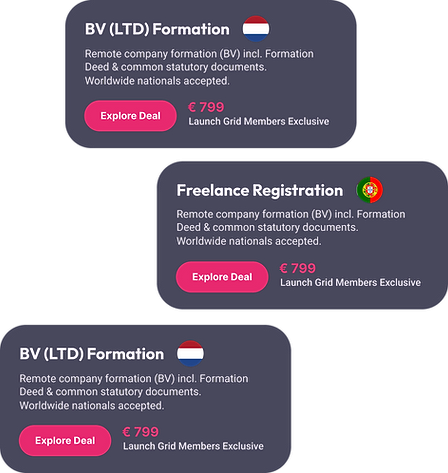We offer pre-made company registrations in Portugal, providing a fast and efficient solution for businesses looking to start operating immediately. With a shelf company, you can bypass the lengthy incorporation process and begin trading without delay.
Use our Entity Management platform to purchase your pre-made company in Portugal. Our site offers a seamless experience to acquire a fully registered business, giving you control and flexibility. Browse available companies, complete your purchase online, and start your operations right away.


When considering business incorporation options in Portugal, you may be faced with the choice between purchasing a shelf company or forming a new legal entity. Each option offers distinct advantages and disadvantages depending on your specific business needs. Below is a comparison of both options in the Portuguese context:
1. Time to Operate
Shelf Companies: These companies are already fully registered and ready for operation. Once you purchase a shelf company, you can start business activities immediately, bypassing the lengthy registration process.
New Entities: Starting a new legal entity from scratch involves a setup process that typically takes several weeks to months, including time for legal registration and obtaining necessary licenses.
2. Reputation and History
Shelf Companies: Shelf companies may have an existing legal history, which can enhance credibility with potential clients and partners. However, this history may not always be favorable, and you’ll need to conduct due diligence.
New Entities: New businesses have no prior legal history, which means you’ll build your reputation from the ground up. While this offers a fresh start, it may take time to establish trust with stakeholders.
3. Compliance and Documentation
Shelf Companies: Shelf companies in Portugal already come with pre-established compliance records. This can simplify the process of meeting regulatory requirements and allow for easier ongoing compliance.
New Entities: New companies require initial compliance setups such as registering with the Portuguese Tax Authority (Autoridade Tributária), drafting articles of association, and completing other legal documentation from scratch.
4. Costs and Expenses
Shelf Companies: Purchasing a shelf company generally involves a higher upfront cost due to the premium for having an immediate, ready-to-use company. However, the ongoing operational costs might be lower since the company is already established.
New Entities: The initial cost for forming a new entity is typically lower, as there are no premiums for an existing business. However, ongoing costs for administration, legal fees, and compliance may be higher, especially during the formation phase.
5. Business Flexibility
Shelf Companies: Shelf companies offer the advantage of immediate operation, but the existing business structure might limit flexibility. You might need to adjust or rebrand to suit your specific business vision.
New Entities: Forming a new entity allows for complete customization of the business structure, governance, and branding to meet your exact requirements. This flexibility is ideal for businesses that need to adapt to specific operational needs from day one.
6. Risk and Legal Exposure
Shelf Companies: Shelf companies can carry pre-existing liabilities or legal obligations. Thorough due diligence is essential to ensure there are no unwanted risks associated with the company. If liabilities exist, the new owner could be held accountable.
New Entities: Starting a new legal entity means there are no pre-existing liabilities or risks. The entity will have a clean slate and the new owner will have full control over its legal standing and obligations.
7. Branding and Identity
Shelf Companies: While a shelf company may have a market presence or established credit, it may not align with the branding goals of the new owners. Rebranding might be necessary to reflect the new business direction.
New Entities: When forming a new company, you have full control over branding, business name, and identity from the outset. This is ideal for entrepreneurs looking to establish a unique image from the start.
Which Option is Right for You?
The decision to purchase a shelf company or form a new legal entity in Portugal depends largely on your business objectives:
Shelf Companies are ideal for businesses that need to begin operations immediately and are less concerned with having a pre-existing legal history or are willing to invest in due diligence to mitigate potential risks.
New Entities are more suitable for businesses that want a clean start, full control over their business structure, and are willing to invest time in the legal process and branding.
Both options offer specific advantages, so choosing between a shelf company and a new legal entity should align with your business priorities, timeframe, and risk tolerance.
Transferring a Portuguese shelf company is a quick and efficient process. With pre-registered companies available for acquisition, the transfer involves minimal paperwork and legal complexities. Our team ensures a smooth transition, handling all the required documentation, including updating the company’s registration with the Portuguese Commercial Registry (Conservatória do Registo Comercial).
This enables you to take control of an established entity within days, allowing you to begin business operations immediately. Shelf companies in Portugal typically come with clean histories and no prior liabilities, offering a risk-free foundation for your business. Our experts streamline the transfer process, saving you time and ensuring a seamless ownership transition.
Shelf companies in Portugal provide an efficient alternative to forming a new legal entity. These pre-registered companies are ready for immediate use, allowing businesses to bypass the lengthy incorporation process. By purchasing a shelf company, you gain access to an established business structure, including compliance documentation and, in some cases, a business history.
This option is ideal for entrepreneurs who need to start operations quickly or those looking to benefit from an existing company's reputation. Shelf companies in Portugal save time, reduce legal complexities, and offer a hassle-free route to business ownership.
"I was looking for a fast and hassle-free way to set up a company in Portugal. The shelf company provided a great solution, and we were able to begin trading right away."
 John M
John M"The customer service was fantastic. The team helped guide us through the process and ensured everything was ready to go quickly and efficiently."
 Sarah L
Sarah L"The shelf company I purchased came with a solid reputation, which helped boost my business credibility right away. Excellent service and communication throughout the process!"
 David K
David KWe offer a selection of established Portuguese companies, ready for immediate operation. By acquiring one of these pre-registered firms, you can bypass the lengthy setup process and start business activities without delay. Each company comes fully compliant with Portuguese regulations, providing a streamlined way to enter the Portuguese market.
Our team ensures a seamless acquisition process, including all necessary documentation and legal updates. Take control of an operational business entity in Portugal today, and enjoy the benefits of a ready-made foundation for your ventures in this dynamic market.










Learn More →


Learn More →


Learn More →
Understanding the Benefits of Launching a Business in Portugal
When expanding a business to Portugal, entrepreneurs can take advantage of the country's strategic position within the European Union, its skilled labor force, and a welcoming environment for foreign investment. Portugal offers access to a diverse and growing customer base, stable economic conditions, and a range of incentives for business owners. Understanding these benefits can help entrepreneurs make informed decisions about international expansion and strategically position their business for success in Portugal’s dynamic market.
Navigating Portugal’s Legal and Regulatory Framework
Launching a business in Portugal requires familiarity with local legal and regulatory frameworks. From company registration and tax obligations to employment laws, understanding Portugal’s regulations is key to compliance and long-term success. Working with local legal and tax experts is advisable, as they provide guidance on Portugal's specific requirements and ensure smooth navigation through processes like obtaining a VAT number, registering with Social Security, and meeting Portuguese labor standards. This expertise can help entrepreneurs establish their business efficiently and avoid potential legal issues.
Building a Network in Portugal
Establishing a strong network is vital when entering Portugal’s business landscape. Building connections with local suppliers, industry partners, and potential clients can provide essential insights into the market and customer preferences. Networking opportunities, such as industry events, trade fairs, and local business chambers, can open doors to partnerships and collaborations that foster growth and integration into the Portuguese market. Additionally, having local contacts helps entrepreneurs access resources and navigate cultural nuances, setting the foundation for a successful and sustainable business presence in Portugal.
Incorporating a business entity in Portugal involves several legal requirements that entrepreneurs must adhere to. Firstly, the process begins with choosing the appropriate legal structure for the business, such as a sole proprietorship, partnership, or a limited liability company (LLC). Each structure has its own set of regulations and implications for liability, taxation, and management. Entrepreneurs must also ensure that the chosen business name is unique and not already registered, which can be verified through the National Registry of Collective Entities (RNPC).
Secondly, the incorporation process requires the preparation and submission of various documents. These include the company's articles of association, which outline the business's purpose, structure, and operational guidelines. Additionally, a fiscal representative must be appointed if the business owner is not a resident of Portugal. This representative will handle tax-related matters on behalf of the company. Entrepreneurs must also obtain a Portuguese Tax Identification Number (NIF) and register the business with the Commercial Registry Office (Conservatória do Registo Comercial).
Finally, compliance with ongoing legal obligations is crucial for maintaining the business entity's good standing. This includes adhering to tax regulations, such as filing annual tax returns and paying corporate taxes. Businesses must also comply with labor laws, including employee contracts and social security contributions. Regular financial reporting and maintaining accurate accounting records are essential to ensure transparency and accountability. Understanding and fulfilling these legal requirements is vital for successfully incorporating and operating a business entity in Portugal.
Professional services can significantly streamline the documentation and registration process for incorporating a business entity in Portugal. These services typically include legal advisors, accountants, and business consultants who are well-versed in the local regulations and requirements. They can assist in selecting the appropriate business structure, ensuring that all necessary documents are accurately prepared and submitted. This includes drafting the articles of association, registering the business name, and obtaining the necessary tax identification numbers.
Moreover, professional services can handle the submission of documents to the relevant authorities, such as the Commercial Registry Office and the National Registry of Collective Entities. They ensure that all filings are completed correctly and on time, reducing the risk of delays or rejections. These experts can also act as fiscal representatives for non-resident business owners, managing tax obligations and liaising with tax authorities on their behalf.
In addition to the initial setup, professional services provide ongoing support to ensure compliance with Portuguese laws and regulations. This includes maintaining accurate financial records, filing annual tax returns, and adhering to labor laws. By leveraging their expertise, businesses can focus on their core operations while ensuring that all legal and administrative requirements are met efficiently and effectively.
Choosing the Type of Entity
In Portugal, the first step in forming a legal entity is selecting the appropriate type, such as a Sociedade por Quotas (Lda), Sociedade Anónima (SA), or a partnership. Each type has its own legal implications, liability protections, and tax considerations. For instance, an Lda is similar to a limited liability company (LLC) and offers limited liability to its owners, while an SA is akin to a corporation and is suitable for larger businesses with significant capital. This decision is crucial as it affects how the entity operates, its tax obligations, and the personal liability of its owners.
Drafting the Articles of Incorporation
Once the type of entity is chosen, the next step is drafting the Articles of Incorporation or Organization, known in Portugal as the "Contrato de Sociedade" for Lda or "Estatutos" for SA. This document outlines the basic structure of the entity, including its name, purpose, registered office, and the details of its shareholders or partners. It's essential to ensure that the document complies with the specific requirements of Portuguese law, including the minimum capital requirements and the appointment of a fiscal representative if the owners are not residents of Portugal.
Filing with the Appropriate Authority
After the Articles are prepared, they must be filed with the appropriate authority, typically the Instituto dos Registos e do Notariado (IRN). This filing formally establishes the entity as a legal entity and often requires the payment of a registration fee. The process can be expedited through the "Empresa na Hora" service, which allows for same-day incorporation. Upon approval, the entity is officially recognized and can begin operations.
Creating Internal Governance Documents
In addition to the Articles of Incorporation, internal governance documents such as bylaws (regulamento interno) or an operating agreement (acordo de sócios) must be created. These documents outline how the entity will be managed, including the roles and responsibilities of its members or directors. They provide a framework for decision-making and conflict resolution within the entity, ensuring smooth operations and compliance with Portuguese corporate governance standards.
Obtaining Necessary Licenses and Permits
After the legal formation, the entity may need to obtain various licenses and permits to operate legally in Portugal. These requirements can vary widely depending on the industry and location. For example, businesses in the food and beverage sector may need health and safety permits, while those in construction may require specific building permits. Failure to secure the necessary permits can result in fines or legal issues, so it’s important to research and comply with all local regulations.
Complying with Ongoing Legal Obligations
Once formed, legal entities in Portugal must comply with ongoing obligations such as filing annual reports, maintaining proper records, and adhering to tax requirements. Regular compliance helps maintain the entity’s legal status and protects its owners from personal liability. This includes submitting annual financial statements to the Commercial Registry and ensuring timely payment of corporate taxes. Staying organized and informed about these obligations is key to the long-term success of the entity in Portugal.
Understanding the Landscape in Portugal
Launching a business in Portugal offers a unique mix of opportunities and challenges. The country has become increasingly attractive to foreign investors, thanks to its stable economy, skilled workforce, and favorable business environment. However, entrepreneurs should conduct thorough market research to understand the specifics of the Portuguese market. This includes cultural nuances, consumer preferences, and the regulatory framework, which can differ significantly from other European countries. Understanding these elements will help you assess potential risks and capitalize on opportunities unique to Portugal.
Building a Strong Foundation
To succeed in Portugal, establishing a strong foundation is essential. Start by tailoring your product or service offerings to align with Portuguese preferences and price points. Consider the local distribution channels, such as partnerships with Portuguese suppliers, e-commerce platforms, or local retailers, which can help you reach your target audience effectively. Building a strong foundation also involves creating a team with knowledge of the Portuguese market, legal requirements, and marketing strategies. Hiring professionals who understand Portugal’s tax laws, business regulations, and cultural context will streamline operations and help ensure your business complies with local standards.
Embracing Flexibility and Adaptation
Portugal’s business landscape is dynamic and competitive, particularly in sectors like tourism, technology, and renewable energy. As such, it's crucial to stay agile and adaptable to evolving market trends and customer needs. Regularly monitoring Portuguese market trends, consumer feedback, and competitor actions will help you stay relevant. Embrace a mindset of continuous improvement, focusing on innovation and customer satisfaction. Flexibility and a willingness to adapt will position your business for long-term success and resilience in Portugal’s evolving economy.
Hiring professionals for assistance can significantly enhance the success of your business in Portugal. Experts such as accountants, lawyers, and marketing specialists can offer valuable expertise tailored to the local market and legal environment. Their support can be essential in navigating complex legal regulations, managing finances, and executing strategic marketing campaigns that align with Portuguese consumer behavior.
A shelf company is a pre-registered, dormant company that has no previous business activities. It is "on the shelf" waiting to be purchased and used by a new owner.
Buying a shelf company can save time and effort compared to starting a new company from scratch. It allows for immediate business operations and can provide a sense of longevity and credibility.
Shelf companies in Portugal are typically available as Sociedade por Quotas (Lda) or Sociedade Anónima (SA), which are equivalent to limited liability companies and corporations, respectively.
Reputable providers ensure that shelf companies have no prior business activities or liabilities. It is essential to conduct due diligence before purchasing.
Feel welcome, and try out our solutions and community,
to bring your business a step closer
to international expansion.

Got questions?
Lets talk about your options
Stay updated with the latest news and exclusive offers. Subscribe to our newsletter for regular insights delivered to your inbox!